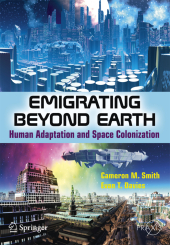 Neuerscheinungen 2012Stand: 2020-01-07 |
Schnellsuche
ISBN/Stichwort/Autor
|
Herderstraße 10
10625 Berlin
Tel.: 030 315 714 16
Fax 030 315 714 14
info@buchspektrum.de |

Evan T. Davies, Cameron M. Smith
(Beteiligte)
Emigrating Beyond Earth
Human Adaptation and Space Colonization
2012. xxiii, 290 S. 45 SW-Abb., 22 Tabellen. 240 x 167 mm
Verlag/Jahr: SPRINGER, BERLIN 2012
ISBN: 1-461-41164-5 (1461411645)
Neue ISBN: 978-1-461-41164-2 (9781461411642)
Preis und Lieferzeit: Bitte klicken
Emigrating Beyond Earth puts space colonization within the context of human evolution. Rather than focusing on the technologies and strategies needed to colonize space, the authors examine the human and societal reasons for space colonization.
Emigrating Beyond Earth puts space colonization into the context of human evolution. Rather than focusing on the technologies and strategies needed to colonize space, the authors examine the human and societal reasons for space colonization. They make space colonization seems like a natural step by demonstrating that if will continue the human species´ 4 million-year-old legacy of adaptation to difficult new environments. The authors present many examples from the history of human expansion into new environments, including two amazing tales of human colonization - the prehistoric settlement of the upper Arctic around 5,000 years ago and the colonization of the Pacific islands around 3,000 years ago - which show that space exploration is no more about rockets and robots that Arctic exploration was about boating!
List of Figures.- List of Tables.- Acknowledgements and Dedications.- About the Authors.- Preface.- Part I: The Context and Uniqueness of Human Evolution and Adaptation.- Chapter 1: The Extraterrestrial Adaptation: Humanity, Evolution and Migration Into Space.- Chapter 2: Stardust: The Origins of Life, Evolution and Adaptation.- Chapter 3: The Adaptive Equipment of the Genus Homo : Symbolism and Niche Construction.- Part II: Arguments For and Against Human Space Colonization.- Chapter 4: A Choice of Catastrophes - Common Arguments for Space Colonization.- Chapter 5: False Choices - Common Objections to Human Space Colonization.- Part III: Human Adaptation to Space - Lessons from the Past and Shaping the Future.- Chapter 6: Starpaths - Adaptation to Oceania.- Chapter 7: Building an Adaptive Framework for Human Future in Space.- Bibliography.- Index.
From the book reviews:
"This book would be a good introduction to the idea of space colonization for those who otherwise might consider it as an utopian idea while reading about the technologies necessary for transporting hundreds of people to distant locations in the Solar System and possibly terraforming a planet. ´Emigrating Beyond Earth´ shows it all more in a way that´s easily understandable and logical without too much previous knowledge." (Kadri Tinn, Astromadness.com, September, 2014)
"A basic premise of this work is that ´human migration into space will be the continuation of the natural process of evolution.´ ... the authors examine the pros and cons of colonization and conclude that it both can and should be attempted. To support their case, they note some potential catastrophes that could lead to the extinction of humans, and believe that space colonization may be necessary for the survival of the human species. ... Summing Up: Recommended. Lower- and upper-division undergraduates and general readers." (T. Barker, Choice, Vol. 50 (6), February, 2013)


